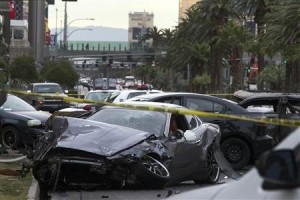 Many people that come into our office say they have “full coverage” for their vehicle, and often times only have coverage that pays for property damage or personal injury in the event of their own fault. This guide explains what the different types of available automobile coverage are in Georgia.
Many people that come into our office say they have “full coverage” for their vehicle, and often times only have coverage that pays for property damage or personal injury in the event of their own fault. This guide explains what the different types of available automobile coverage are in Georgia.
1Bodily Injury Liability
Bodily injury liability, often abbreviated (BI) is coverage for any personal injury you cause to another person. If your policy merely states “liability” and three numbers divided by slashes (i.e. 25/50/25) this is insurance shorthand for the policy limits of both your bodily injury liability and property damage liability. In the aforementioned example, 25,000 is the limit per person for bodily injury, 50,000 is the limit for bodily injury per accident, and 25,000 is the limit per accident for property damage. Georgia law requires that you carry at least 25,000 in liability coverage per person and 50,000 per accident for bodily injury. This coverage is what an at fault party has available to pay for your injuries if you are involved in an accident.
2 Property Damage Liability
Property damage liability is the coverage available to pay for the damage to someone else’s vehicle in the event you are at fault for an accident. Georgia law requires a minimum of 25,000 in property damage liability.
3 Comprehensive Coverage
Comprehensive coverage pays for loss or damage to your vehicle caused by fire, theft, vandalism, hail, windstorm, riot, falling objects, flood, collision with an animal, and other events as stated in your policy contract. Comprehensive coverage often does not cover stolen items from your vehicle, merely the damage done in the commission of that theft. It is good to have renter’s insurance as well to cover personal items within your vehicle, but comprehensive coverage will cover the vehicle itself.
4 Collision Coverage
Collision coverage pays for damage to your vehicle caused by a car wreck with another vehicle or stationary object, regardless of whom is at fault. Collision does not pay for incidents covered under Comprehensive (such as theft, fire, or collision with an animal). Generally, if you are not at fault, you can use your collision coverage to pay for your vehicle’s repairs and seek indemnification (repayment) from the at fault party’s property damage liability coverage. If you are at fault for the accident, your collision coverage repairs your vehicle. Collision coverage pays for repair, towing, and storage costs related to the accident. If repairing your vehicle is not reasonable, this coverage pays you the fair market value for your vehicle prior to the accident.
5 Medical Payments Coverage
Medical payments coverage, often abbreviation as MED PAY, is an insurance coverage that pays your medical bills for any personal injuries you sustain in an accident, regardless of whom is at fault. If you do not have medical insurance, you have a medical insurance plan with a high deductible, or you have some type of medical savings account through your employer, it is a good idea to have medical payments coverage just in case you are involved in an accident. Whether it’s your fault or not, you’ll be able to get the medical treatment you need to get back to where you were before the accident.
6 Uninsured Motorist Coverage.
Uninsured motorist coverage is the only coverage that you can purchase that protects you from other motorists on the road. It is one of the most important types of insurance to purchase, and recent Georgia law requires that you affirmatively waive uninsured motorist coverage. There are many types of uninsured motorist coverage, but the wisest purchase for any driver is uninsured motorist extended or add-on (often abbreviated as UME or UMA). This coverage is applicable if a person hits you, is at fault for the accident, and is uninsured OR underinsured. Your insurance company will be required to pay your medical bills, lost wages, property damage, pain, and suffering if these damages exceed the available liability insurance of the at fault party. I recommend to client to purchase as much uninsured motorist add-on coverage as they can financially afford to spend. It protects you from less careful people and people with cheap minimum liability coverage.
Call With Any Questions
If you would like a free consultation about what your insurance coverage is and what you should purchase, feel free to contact me at the Dozier Law Firm any time. My phone number is 478-742-8441. Remember, you do not have full coverage if you do not have uninsured motorist add-on or extended coverage.
NOTE: Repost from my avvo.com page.